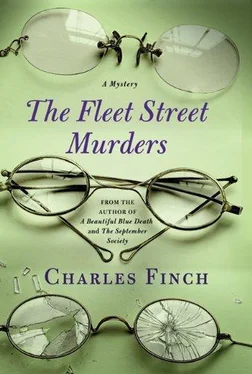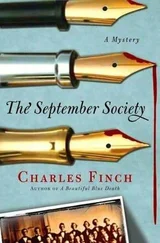Charles Finch - Fleet Street murders
Здесь есть возможность читать онлайн «Charles Finch - Fleet Street murders» весь текст электронной книги совершенно бесплатно (целиком полную версию без сокращений). В некоторых случаях можно слушать аудио, скачать через торрент в формате fb2 и присутствует краткое содержание. Жанр: Исторический детектив, на английском языке. Описание произведения, (предисловие) а так же отзывы посетителей доступны на портале библиотеки ЛибКат.
- Название:Fleet Street murders
- Автор:
- Жанр:
- Год:неизвестен
- ISBN:нет данных
- Рейтинг книги:5 / 5. Голосов: 1
-
Избранное:Добавить в избранное
- Отзывы:
-
Ваша оценка:
- 100
- 1
- 2
- 3
- 4
- 5
Fleet Street murders: краткое содержание, описание и аннотация
Предлагаем к чтению аннотацию, описание, краткое содержание или предисловие (зависит от того, что написал сам автор книги «Fleet Street murders»). Если вы не нашли необходимую информацию о книге — напишите в комментариях, мы постараемся отыскать её.
Fleet Street murders — читать онлайн бесплатно полную книгу (весь текст) целиком
Ниже представлен текст книги, разбитый по страницам. Система сохранения места последней прочитанной страницы, позволяет с удобством читать онлайн бесплатно книгу «Fleet Street murders», без необходимости каждый раз заново искать на чём Вы остановились. Поставьте закладку, и сможете в любой момент перейти на страницу, на которой закончили чтение.
Интервал:
Закладка:
He paused, suddenly slightly discouraged. He hadn’t any clue how many night guards there were here, or what their beats were, and he hadn’t any clue either where he would find George Barnard. Or if he would find George Barnard. Somehow in his own bed it had seemed so intuitive, so correct, that the man would return to the place he had been most comfortable. The illusion of fleeing London had seemed to dovetail so well with his insight-and the fact of his keeping an office here-his long history of thievery-his emptied bank accounts.
Now, however, it all seemed insubstantial, even implausible.
His nerves on edge, Lenox stepped into the hallway. He had worn his soft-soled boots, which were much quieter than his others, but he still made noise. Walking west down the corridor, toward where he knew the Master’s office to be, he stopped to examine the brass nameplates on each of the doors of the nicest offices. None of them bore a name he knew, and he decided to turn left at the corner.
Suddenly, he heard a soft whistling.
He froze and then pressed himself tight up against the wall. The sound drew closer and closer, coming toward him, and soon he saw coming from the corner he had meant to turn a guard, clad in black.
Just as this guard was about to discover the Mint’s intruder, however, he abruptly stopped. Lenox saw him check his watch and turn on his heel to walk in the other direction.
His heart blazing, the detective forced himself to gulp deep breaths of air and steady his frayed nerves. He let one minute pass, then two minutes, then three. Finally he decided to go.
Just as he stepped away from the wall, an arrogant, cultivated voice spoke.
“Charles Lenox!” said the voice with a smile in it. “Now what on earth could you be doing here?”
Lenox turned, his hands raised.
The security guard stood there-and beside him the man who had spoken. George Barnard.
CHAPTER FORTY-FIVE
Couldn’t sleep,” said Lenox with the hint of a smile, his hands still raised. “Thought I’d go for a walk.”
“I can’t congratulate you on the place you chose for it,” said Barnard, hands clasped behind his back.
Lenox decided to speak to the guard directly. “I’m here on behalf of the police,” he said. “Mr. Barnard is wanted at Scotland Yard.”
The guard made no move, and Barnard laughed hollowly. “Who do you think hired this gentleman, Charles? Use your intelligence. Half of the people who work in this building owe their jobs to me.” He paused. “It’s disappointing that you’ve found me so soon. I thought I had several weeks.”
“You should have had your horseshoes changed after you pretended to go to Geneva,” said Lenox.
Barnard didn’t respond to this. “Well, we shall speak soon enough. Westlake, take this man up to my office. I’ll be there in fifteen minutes. If you want any tea, Charles, let Westlake know.” He chuckled. “Must maintain the civilities, eh?”
Barnard’s office was small and graceful, with a beautiful view of the Thames, exactly the sort of office-second best in the building, perhaps third-that an emeritus director would have wanted. There were coinage charts on the walls, and a long bookcase was full of volumes on recondite subjects: a history of the shilling coin, the memoir of an old currency designer.
Lenox had time to examine all of this as he and the crooked guard sat in the office, which was lit only very dimly by a single, muted lamp. He wasn’t tied up, and he still had his bag at his side. If he could get into it, then perhaps…
Barnard appeared in the doorway and dismissed Westlake to the hall. He sat in the chair behind his desk and poured himself a stiff Scotch. He offered Lenox a glass, which was declined.
Barnard was a bluff, large man, with pink coloring and a bristle of the straw-colored hair older men who have been blond in their youths develop. He had a strong chin and eyes that seemed slightly too small for his head but were undeniably sharp and intelligent. His dress tended to be pompous, if not showy, and at the moment he had on an immaculately tailored suit, which managed nonetheless to look secondhand and lived-in, comfortable. He was usually the liveliest and loudest man in the room, with a blunt, bullying manner, but now he seemed suddenly sunken, diminished.
There was a long, long silence, during which the two men very frankly observed each other-rivals and enemies for more than a year, though only one of them had known it all that time, now finally face-to-face, both in full cognizance of the stakes. Their lives.
Finally, after a great, heaving sigh, Barnard asked Lenox, “How did you know?”
Lenox didn’t know what to say; he could play his cards close to the vest, or he could tell Barnard everything. Did it matter? If he did the latter, he might make time for Jenkins to come. For he felt certain Barnard planned to kill him.
“Poole confessed to me, in fact, the other-”
“No, no,” said Barnard. “That’s all immaterial. How did you know about-about all of it?”
“All of it?” said Lenox.
“Listen, Poole would never have implicated me. I beat it into him day and night that there was nothing worse than a rat. Think about his father! He confessed to the Yard-only to you did he admit that I was his friend, or that I was involved.”
“Why should there be anything else?” asked Lenox. “The murders aren’t enough?”
“Ever since that damn maid died in my house… I’m not stupid, Lenox. I could see in your eyes the revulsion you felt, feel it in your handshake, after that. Still I figured I had time… I thought I had time. I covered my tracks so well.” Barnard took a sip and sighed again, the sigh of a man at a crucial moment of his life, who knows that nothing can be as it was. “How did you know?”
“It’s a difficult question to answer. I knew you stole that money, back then, and suddenly-well, nobody ever quite knew how you got your money, George, and I somehow doubted it was your first theft, especially because I knew you were connected to the Hammer Gang. I have since you set those two Hammers to thrash me, when you wanted me to stop looking into the maid’s murder. Their tattoos gave them away.”
“You knew that?” asked Barnard, astonished. “I thought you might have an inkling-I told them again and again they should never get those laughable tattoos. Why mark yourself for what you are?” It was a philosophy that encapsulated Barnard’s rise through the world. “You knew about the Hammers and me?” he repeated.
“Yes.”
“Then a man died in vain.”
Lenox felt his stomach plummet. “Exeter found out?”
Barnard nodded. Almost casually, he pulled open a drawer of his desk and pulled a gun out of it.
“That’s why he died in the East End near the gang’s base.”
“Yes.”
Lenox felt sick. “Then-why haven’t you killed me? I knew worse than he did.”
“You’re a gentleman,” said Barnard. “I couldn’t kill a gentleman. A journalist, a police officer, perhaps-if it were crucial.”
Lenox almost laughed. Saved at the last by Barnard’s snobbishness; saved at the last by Barnard’s insecurity about his own tenuous relations to the upper class of his nation. It was remarkable how a brilliant mind could in one aspect have been so blind.
“Yet you mean to now?”
Barnard seemed to sense Lenox’s incredulousness and bridle against it. “Then there was a practical side to it. If I killed you I felt sure that letters would be instantly dispatched to the proper authorities. That what proof you had against me would be laid out-that-well, any of the ruses a clever man would have devised to ensure either his own safety or his enemy’s downfall.”
Читать дальшеИнтервал:
Закладка:
Похожие книги на «Fleet Street murders»
Представляем Вашему вниманию похожие книги на «Fleet Street murders» списком для выбора. Мы отобрали схожую по названию и смыслу литературу в надежде предоставить читателям больше вариантов отыскать новые, интересные, ещё непрочитанные произведения.
Обсуждение, отзывы о книге «Fleet Street murders» и просто собственные мнения читателей. Оставьте ваши комментарии, напишите, что Вы думаете о произведении, его смысле или главных героях. Укажите что конкретно понравилось, а что нет, и почему Вы так считаете.












